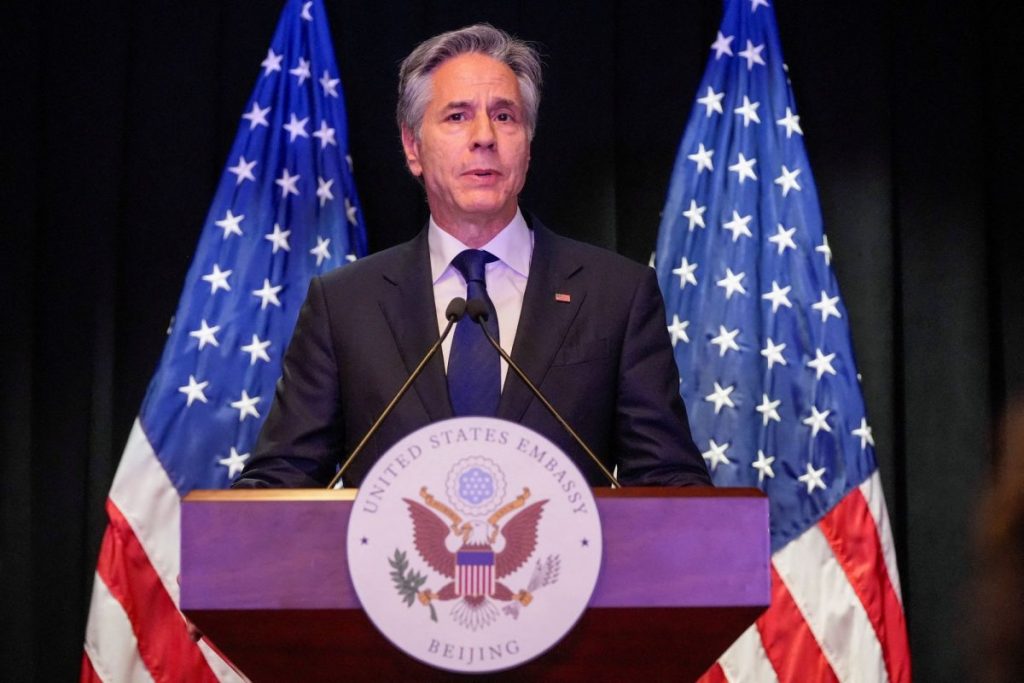The Biden administration is urgently working to prevent a dangerous escalation of violence in the Middle East as tensions mount between Israel and Iran. The situation threatens to unravel a fragile cease-fire deal in the Gaza Strip and underscores the limitations of American influence over its closest ally in the region.
Iran is believed to have enhanced its military capabilities with drones and ballistic missiles that could challenge Israel’s defenses. Meanwhile, Hezbollah, the Iranian-backed militant group in Lebanon, has amassed tens of thousands of rockets and precision-guided missiles capable of overwhelming Israel’s air defense systems.
In response, the United States has bolstered its military presence in the region, deploying a squadron of F-22 fighter jets and naval destroyers closer to Israel. U.S. officials describe these measures as a deterrent against what they perceive as an imminent threat from Tehran.
Secretary of State Antony Blinken has been leading diplomatic efforts to urge restraint from Iran and its allies. “No one should escalate this conflict,” Blinken told reporters on Tuesday. “We have been engaged in intense diplomacy with allies and partners, communicating that message directly to Iran and Israel.”
The potential for a coordinated attack by Iran and Hezbollah poses a serious threat to Israel’s defense capabilities. The situation is further complicated by the uncertain support from Arab nations for a U.S.-led coalition, as seen in previous conflicts.
In a significant diplomatic move, Jordanian Foreign Minister Ayman al-Safadi visited Tehran over the weekend to call for regional calm, marking the first visit of its kind in more than two decades. Egyptian Foreign Minister, Badr Abdelatty, also engaged in rare communication with his Iranian counterpart, urging restraint following encouragement from the Biden administration.
Iraq has been drawn into the diplomatic efforts, with Blinken urging Prime Minister Mohammed Shia al-Sudani to leverage Iraq’s relationship with Iran to emphasize the need for de-escalation. Qatari Prime Minister Mohammed bin Abdulrahman Al Thani reportedly conveyed a stark warning to the Iranians, stating that they would be the “biggest loser” if they chose to escalate the conflict.
Adding to the complexity of the situation is a shifting sentiment among the American public. A recent poll conducted by the Chicago Council on Global Affairs revealed that, for the first time in recent years, a majority of Americans oppose sending U.S. troops to defend Israel if it comes under attack. According to the survey, 55 percent of Americans are against military intervention, while 41 percent support it. The poll also indicated that Republicans are more supportive of deploying troops to defend Israel.
Erdogan’s Frustration Mounts as Turkey Is Sidelined in Gaza Diplomacy
In the midst of mass protests across Turkey against Israel’s military operations in Gaza, President Recep Tayyip Erdogan finds himself increasingly sidelined in international efforts to mediate the conflict. This exclusion from key diplomatic negotiations has sparked visible frustration in the Turkish leader, whose fiery rhetoric against Israel has been a defining feature of recent weeks.
Erdogan has long sought to position Turkey as a major player in the Middle East, but recent developments have seen other countries, such as Qatar, Egypt, and China, take the lead in brokering discussions between Israel and Hamas. According to analysts, Erdogan’s outspoken criticism of Israel is not just about the conflict itself but also a reflection of his dissatisfaction with Turkey’s diminished role on the negotiating process.
“Erdogan’s rhetoric is an expression of mounting frustration in Ankara over being left out of the diplomatic processes aimed at securing a cease-fire and planning Gaza’s reconstruction,” said Selin Nasi, a fellow at the London School of Economics’ Contemporary Turkish Studies Department, speaking to Voice of America.
This diplomatic sidelining became particularly evident when China hosted Palestinian leaders, further highlighting Erdogan’s waning influence. Erdogan’s disappointment was made clear when he publicly demanded an apology from Palestinian Authority leader Mahmoud Abbas, who had declined an invitation to speak before the Turkish parliament.
The protests in Turkey, which drew tens of thousands into the streets of cities like Istanbul and Ankara, underscore the widespread anger among the Turkish public regarding the violence in Gaza. However, they also coincide with Erdogan’s political maneuvering at home, as he seeks to consolidate his nationalist conservative base.
Amid the tensions, Turkey has imposed a trade embargo on Israel, escalating the war of words between the two nations. Analysts caution that these developments could lead to a more perilous diplomatic confrontation between Turkey and Israel.
The current situation places Erdogan in a challenging position as he tries to navigate Turkey’s foreign policy in the context of shifting regional dynamics. His strong stance against Israel, while resonating with certain domestic constituencies, risks further isolating Turkey from key international discussions.
As the conflict in Gaza continues, Erdogan’s ambitions to reassert Turkey’s influence are facing significant obstacles, with potential implications for Turkey’s relationships within the region and beyond.









